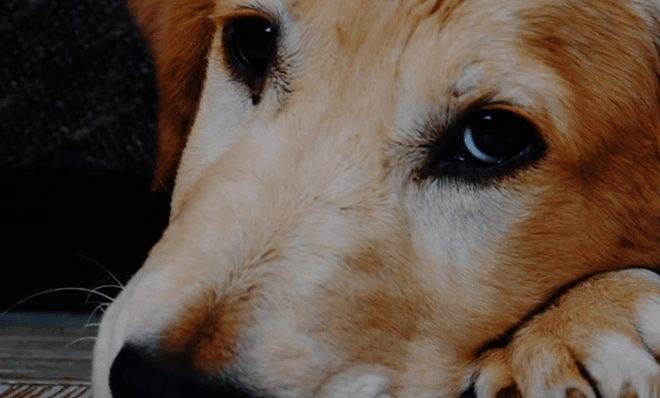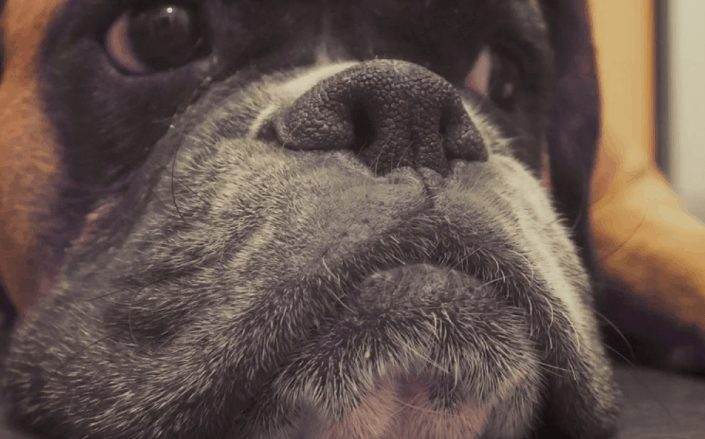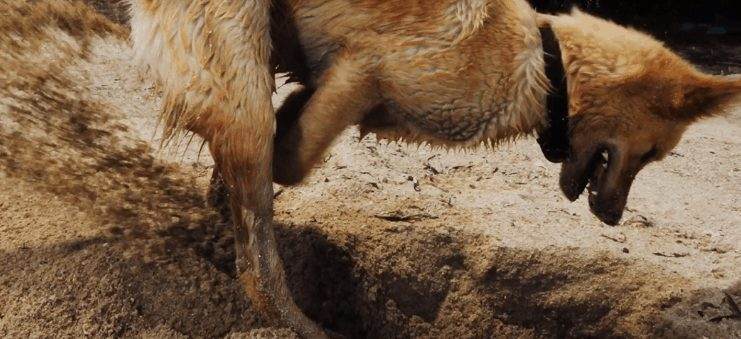When it comes to stopping your puppy from digging the soil in your backyard or outside, the use of barricade gates, burying ballon at the site of frequent digging, a lot of exercises and insect treatment in the backyard are some of the recommended solutions.
Owning a puppy who loves digging holes can be a nuisance, particularly if you enjoy having a well-manicured landscape.
It’s important to know that dogs have instincts to dig, and some breeds tend to dig even more than others. That is partly because their early ancestors, such as foxes and wolves, dig dens where they sleep and also raise their puppies.
That is why most dogs tend to dig and also rest in holes full of dirt since it resembles a den with pretty comfortable temperatures.
Even in the home, some dogs enjoy digging at their blankets or bedding, circle around, and later lay down in an incredibly comfortable position.
So if you want to know how to stop your puppy from digging keep reading.
A video showing dogs digging is listed below:
Why is Your Dog Digging Holes All of a Sudden
There are numerous reasons why puppies dig holes in the yards. Many of the reasons are behavioral or instinctual, and not necessarily something to worry you.
In many occasions, the advice given by behavioral therapists or some specific training can completely stop the digging habit, and there are other several ways to prevent your dog from digging a lot. Some of the reasons why most dogs dig holes include:
1. Puppies Like Babies Are Curious
If your dog is a small puppy, remember that puppies have unappeasable curiosity. They dig, tunnel and chew things as they explore the world. It is normal for puppies to dig, but with a little effort, you can help them stop.
2. It All Started When He Was a Puppy
Most puppies dig out of curiosity, and if they are not taught that digging is wrong, they continue with this instinctive and normal behavior in their adulthood. To prevent this, look for another way to help your puppy satiate their curiosity.
3. Separation Anxiety Could be the Issue
If your puppy has anxiety due to various factors such as loneliness, if it was a rescue puppy that had a bad experience with previous owners, or lives in a stressful environment, he might be anxious most of the time.
Most dogs, particularly rescues, have many challenges even when they find a good home.
4. The Puppy Wants to Escape From Something
Some dogs dig to escape confinement especially when they are anxious and lonely. Bored dogs might be seeking someone or something to play with somewhere beyond the fence.
5. He Looks at Roots or Soil as Food
Busy dogs might discover that digging excessively in specific parts of the backyard will yield incredibly delicious food.
Dogs will keep themselves busy digging and playing with roots and plants that are challenging to pull out. Some puppies uncover, chew and consume the roots, sticks, plants and the dark soil.
6. The Puppy Wants to Hunt
Your dog could be inadvertently alerting you about some animals burrowing beneath the ground. While some of these animals might be harmless critters, your dog will continue pursuing them.
Their burrowing can put the foundation of your house in jeopardy depending on the location and expanse. If you find or suspect proof that this is the reason why your pet is digging, ensure that you call animal control.
7. Burying Behavior
Some puppies have instincts in which they should bury their treats, bones, or toys. That is a way of safeguarding their most treasured items, and if they need it later, they’ll dig up the area where they previously buried it and then fetch it out.
Why Digging Could be Full of Hazards
The most beautiful parts of your yard could be the most dangerous to your pet. Many popular types of flowers can be toxic to animals, which can lead to diarrhea, vomiting, seizures, and even death.
Also, most stinging insects such as bees, hornets, and wasps normally make their nests below the ground level, and when your dog is digging, they might disturb these insects.
If your dog mistakenly digs up these insects, they can attack your puppy stinging the whole body. That can lead to allergic reactions or toxic accumulation which can kill your dog instantly if not treated.
Why Your Dog is Digging Holes
If your puppy’s digging is damaging your yard and causing distress, you should consider making an appointment with your vet.
Your veterinarian will help you find answers and treatment to this behavior. Apart from suspecting some medical problems, your vet might also focus on the behavior of your dog at first.
If your pet has some behavioral issues that are causing them to dig, like anxiety, the vet might recommend a behavioral expert to visit your home and help you in easing his stress and assist him in staying calm.
The vet might also prescribe some medications to help with the anxiety if it’s severe or give you other suggestions you can try at your home to control his digging behavior.
Tips for Stopping Dog Digging Habits
1. Using Pepper
One of the ways to prevent puppies from digging in particular spots is to sprinkle some pepper on the ground. That also assists in keeping away wild animals such as squirrels and rabbits.
2. Natural Dog Digging Deterrent Like Using Barricade Gates
You can protect the fence space with some dog digging deterrents like chicken wire fencing, rocks, or other barricade-like methods to prevent your pup from digging under the fence.
3. Teaching Them Not to Dig
If your pet already knows how to STAY and SIT on command, try working on the STOP command. Take a couple of minutes each day to train your pup, and this will assist in fulfilling their need for mental stimulation.
If they stop digging on command praise them and give them a toy or treat to replace this unwanted behavior.
4. How to Stop a Dog from Digging for Moles
Dogs love chasing small animals such as moles, gophers, rabbits, chipmunks, and even insects. Maybe your dog is digging around the base of bushes, decks or trees because they are hunting some prey. If that is the case:
- Get rid of the rodents by finding a humane way of removing them by fencing or using some other natural remedies.
- Avoid using anything toxic because poisons might get rid of the rodents, but they can also poison your pet as well.

5. Quick Hack to Stop Puppy Digging Garden
If you give your puppy a digging pit, it can learn to happily bury toys and other objects without destroying the yard.

6. Create Safe Discouragement : No Punishment
If you want to associate your disapproval with digging behavior then catch them in the act of digging a hole. Digging happens while you are away, you have to make digging less pleasurable for the dog.
You can add a fence to seal an area of frequent digging. Even a small gate may help discourage him.

6.1 Surprise Your Puppy
You can use a balloon to discourage him. Get a small size balloon and bury it in the place of frequent digging. As soon as the dog starts to dig, the surprise of popping the balloon will take away the pleasure.
6.2 Tire Him Out
Exercise tires out puppies and reduces digging and makes your pet much better behaved. Spending 20 minutes of cardio or aerobic exercise twice a day is a good rule.
Just make sure both you and your pet don’t overheat when playing fetch.

Don’ts When Solving Your Dogs Digging Habit
- Avoid leaving your dog outdoors unattended. Ensure that you go outside with your puppy when they want to go out.
- Don’t fill the holes using water. Filling the holes with water will only increase the desire to dig, particularly with a Labrador.
- Avoid punishing your furry friend for digging. Punishing or reprimanding your dog will only instill fear and weaken your relationship with your pet in the long run.
Conclusion – Stop Dog From Digging Home Remedy
Although digging can be a natural behavior for most dogs, it can be harmful to the well-being and health of your puppy.
The key to avoiding this behavior is strict monitoring, which takes time and diligence. Although it’s not always possible to go outdoors with your puppy every time they go outside, that’s the only way to curb the digging habit.
If you have tried everything without success, you can look for a behavioral therapist and maybe they can visit your home and help train your puppy or offer you some advice.
If you feel it’s necessary, your local vet can recommend a reputable behavioral therapist.
I hope all of the above tips can help you out.
References
- https://vonfalconerk9.wordpress.com/page/2/
- https://brill.com/view/journals/beh/6/1/article-p35_3.xml
Table of Contents